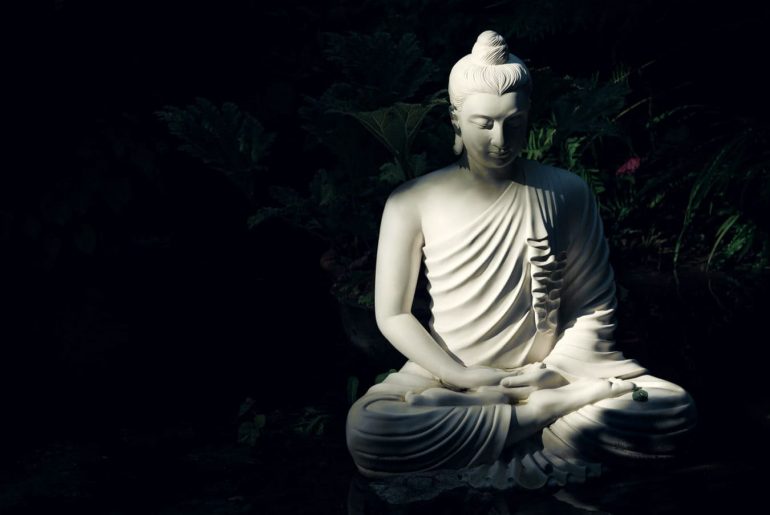Buddhism, which, together with Christianity, Hinduism, Islam and Judaism, is one of the five major world religions, is exerting an increasing fascination on stress-stricken people in western industrialized countries.
Meditation as a path to enlightenment
In contrast to the two great revealed religions, Christianity and Islam, Buddhism is not concerned with the revelation of the divine will in a self-communication of God to man and, as a consequence of this revelation, with the belief in this revealed God. Rather, the center of the Buddhist world view is the knowledge of truth through enlightenment; That the Buddhist can attain enlightenment through meditation, to awaken “from the night of error and ignorance”, is reflected in the meaning of the word “budh”, “awakening”. “Buddha”, “the enlightened one” or “the awakened one”, is an honorary title in Sanskrit that was bestowed on the former prince’s son Siddharta Gautama after he had meditated from ascetic to enlightened one by explaining the cause of suffering and the way to it recognized its cancellation.
The Life of Prince Siddhartha Gautama
As the only founder of the religion, the prince’s son Siddharta Gautama is said to have grown up in the luxurious palace of a noble family of the Kshatrija caste. His father was Raja, that is, regent of a southern Nepalese republic. The young Siddharta only left this overprotected comfort zone four times and as a result experienced an existential crisis, since he first came into contact with the basic forms of human suffering at the age of 29: old age, illness and death. Finally, on the fourth exit, Siddharta meets an ascetic, whereupon he leaves his existence as a husband and father at the princely court behind in order to embark on a quest for the truth as a wandering monk. Neither the teachings of wise gurus nor the strictest asceticism in years of solitude put Siddharta on the path to salvation, and so he remained in almost defiant meditation under a fig tree until he attained enlightenment. Accompanied by five monks, the “Buddha” now went to Benares, where he gave his first sermon on knowledge and salvation, which from then on had become possible for all people. For 45 years he preached throughout north-eastern India before dying in 480 BC at the age of 80 from a tainted dish of mushrooms.
The Four Noble Truths
Buddha’s central insight is the teaching of the “Four Noble Truths”, which liberate man from the cycle of rebirth and hold out the prospect of salvation in Nirvana:
- The truth of life as suffering.
- The truth of the causes of suffering.
- The truth of the cessation of suffering.
- The truth of the path to the cessation of suffering.
Mindfulness as a way of life
The Fourth Truth describes the “Noble Eightfold Path”, which summarizes the entire Buddhist path to salvation in Nirvana with the first three Noble Truths:
- Right Knowledge (of the Four Noble Truths)
- Right thinking (overcoming self-centeredness)
- Right Talking
- right action
- Right way of life
- right striving
- Right Mindfulness
- Right self-immersion
Only through many rebirths can the eightfold path be trodden and finally lead to eternal peace in Nirvana; this signifies liberation from the chain of rebirth and final redemption.
Rebirth and karma
Buddha adopted the concept of karma from Brahmanism. It denotes the philosophy of the totality of good and bad actions and the corresponding consequences of the actions. Karma is the Sanskrit term for “action, deed”. According to the principle of cause and effect, action characterizes all life cycles of a person. After death and reincarnation in a new body, the soul is determined by previous karma and in this way can cyclically approach nirvana by attaining higher and higher levels of consciousness.
The Hinayana School of Buddhism
This school is also called “small vehicle” with a mocking undertone and can be traced back to Buddha and his first followers.
For the layperson there are five moral precepts:
- not kill and hurt
- not steal
- abuse anyone
- do not lie
- do not take any intoxicating substances
Five more commandments apply to monks and nuns.
The Mahayana School of Buddhism
According to the teaching of the “Great Vehicle”, every human being carries a secret Buddhahood within himself: the ideal here is the “Bodhisattva”; he does not attain enlightenment for himself alone, but through his own rebirths on earth he helps his fellow human beings to attain liberation from the cycle of reincarnations.
Who or what was Buddha?
The Historical Buddha: Siddhartha Gautama. Buddha literally means “awakened” and in Buddhism refers to a person who has experienced enlightenment. The founder of the Indian religion, Siddhartha Gautama, is behind the historical figure of the Buddha.
What is the real name of Buddha?
Buddhism goes back to Buddha Siddharta Gautama. His way of life and knowledge also explains the basic pillars of Buddhism. About 2560 years ago a son was born into the Shakya royal family. His parents, who rule over a kingdom in present-day Nepal, call him Siddharta.
What did Siddhartha Gautama do?
The name Buddhism derives from the fact that the honorific name Buddha was given to the founder, which means “the awakened one”.
Is the Buddha a god?
Buddhism is one of the major world religions. Unlike other major religions, Buddhism is not a theistic religion, meaning it is not centered on the worship of an almighty God.
What are the 5 basic rules of Buddhism?
The Hinayana School of Buddhism
not steal. abuse anyone. do not lie. do not take any intoxicating substances.
- not kill and hurt
- not steal
- abuse anyone
- do not lie
- do not take any intoxicating substances
Is the Dalai Lama a Buddha?
The current 14th Dalai Lama is the Buddhist monk Tenzin Gyatso.
How many different Buddhas are there?
In the Pali Canon, the history of the Buddhas before Siddharta Gautama is recorded in the Buddhavamsa. These Buddhas also play a role in Jainism. The names are given in pali, alternate spellings in parentheses.
Was Buddha a vegetarian?
Practical use. But despite these clear explanations, not all Buddhists are vegetarians, as is often assumed. On the contrary, many Buddhists eat meat on the grounds that the Buddha permitted meat to be eaten unless the animal was killed specifically for them.
What is the scripture called in Buddhism?
The discourses (sutras) of the Buddha, the disciplinary writings (Vinaya) and the scholastic or philosophical texts (pi.: Abidhamma) together form the canon of the scriptures of Buddhism.
What do Buddhists eat?
Buddhists generally follow a vegetarian or vegan diet as killing animals is said to lead to bad karma and is therefore forbidden. However, there is no general ban on eating meat in Buddhism. Alcohol, gelatin, and onions are avoided by most Hindus and Buddhists.
What is the main symbol in Buddhism?
Dharmachakra (Sanskrit, m., धर्मचक्र, dharmacakra, the “wheel of the law”, from chakra = wheel and dharma = law) is the symbol of the teaching proclaimed by Buddha in Buddhism. The spokes symbolize the eightfold path.
What is the most important festival in Buddhism?
Today the Buddhists celebrate the festival of Vesak, the most important festival of the Buddhists. On this day, people commemorate Buddha’s birth, enlightenment and death. It’s a colorful happy festival. People decorate their houses and visit the temples and offer sacrifices.
How to pray to Buddha
A bell rings and everyone, with an utmost effort, sinks into silence. One sits like that for many hours. Meals are also taken in silence.
What happens to Buddhists after death?
Whoever dies will start a new life somewhere. That’s what Buddhists believe. For them, death is a new beginning. Buddhists believe in reincarnation: after death, a person’s spirit leaves its old body and seeks a new one.
Why is Buddhism not a religion?
There is no deity in Buddhism, no “religio”, i.e. no connection to a creator being. There is only Buddha who taught a doctrine and set an example.
Why don’t Buddhists have a god?
The believers worship Buddha as an enlightened one, i.e. as a very wise person – but he is not considered a god. In some streams of Buddhism there are also different gods, but they do not have the same importance as the god has in Christianity, for example.
What does Buddha say about life?
“Don’t dwell on the past, don’t dream of the future. Focus on the present moment.” “It’s no use just being a good person if you don’t do anything!” “You will be tomorrow what you think today.”
Are Buddhists selfish?
Buddhism tries to exorcise people’s greed and selfishness, but unfortunately greed and selfishness are also the engine of our ambition, which in turn is one of the most important engines of progress.
Can anyone become a Buddha?
Like Hinduism and Taoism, Buddha’s teaching is a religion of experience. The aim is to develop one’s own spirit, to attain the “Buddha nature”. This means that the ability to become enlightened is already present in every human being.
How does a Buddha bring happiness?
Rubbing the belly of a Buddha image is said to bring good luck and prosperity. The big belly represents prosperity and his smile represents happiness.
What does a Buddha tattoo mean?
Enlightenment to charity, caring, wisdom & genuine love.
Why does the Buddha have such long ears?
His elongated earlobes are also typical of the founder of the religion. “Those long ears mean he used to have jewelry, but he hasn’t. But everything about Buddha’s body is symbolic: his robe, that he is a monk, represents frugality.
Who Invented Buddhism?
Siddhartha Gautama is considered the founder of the Buddhist teachings. He probably lived and taught around 500 BC in northern India on the border with modern-day Nepal. He is better known by his honorary title: “Buddha”, “the awakened one”. According to legend, he was born in Lumbini, the son of a local prince.
What is meant by the term karma?
Karma is a spiritual concept that describes the principle of cause and effect. In Hinduism, Buddhism and Jainism, karma describes the consequence of every deed and action, the effect of thoughts. According to this concept, every action, whether physical or mental, has a consequence.
What does Buddha teach?
At the center of Buddhism is the teaching of the Buddha: Everyone can achieve knowledge of the truth through enlightenment, with the help of meditation. Buddha is not a god, there are no gods in Buddhism. “Buddha” means “The Enlightened One” and is a title for people who have attained true knowledge.





